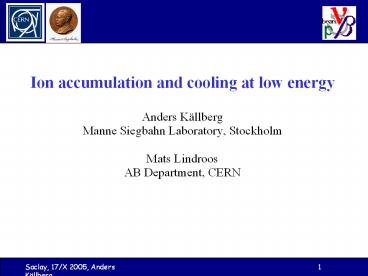Ion accumulation and cooling at low energy - PowerPoint PPT Presentation
Title:
Ion accumulation and cooling at low energy
Description:
The Design Study is aiming for: A beta-beam facility that will run for a 'normalized' year of 107 seconds ... The cooling time should be of the same order as ... – PowerPoint PPT presentation
Number of Views:18
Avg rating:3.0/5.0
Title: Ion accumulation and cooling at low energy
1
Ion accumulation and cooling at low energy
- Anders Källberg
- Manne Siegbahn Laboratory, Stockholm
- Mats Lindroos
- AB Department, CERN
2
FLUX
- The Design Study is aiming for
- A beta-beam facility that will run for a
normalized year of 107 seconds - An integrated flux of 5.51018 anti-neutrinos
(6He) and 16.51018 neutrinos (18Ne) in ten years
running at g100 - with an Ion production in the target to the ECR
source - 6He 21013 atoms per second
- 18Ne 81011 atoms per second
- Baseline 2 anti-neutrinos 151018,
- neutrinos 0.231018 in ten years
3
Increasing the intensity
- Basic ideas
- Use 19Ne production 20 times higher than 18Ne
(lifetime 10 times longer) - Accumulation of ions in (or before) the RCS
- Electron cooling of the ions in the RCS makes
accumulation possible - The ions are continuously cooled in all
dimensions which gives space for the injection of
more ions
4
Longitudinal cooling of d
5
Transverse cooling of Pb54
EPb4.2 MeV/u Ie91 mA
6
Requirements
- The electron cooling needs to be fast enough. The
cooling time should be of the same order as the
repetition time of the injected pulses (1/10 Hz). - Transverse cooling is normally slower than
longitudinal - Cooling time depends on the initial emittance
- _at_ 100 Mev/u Ue-gun 55 kV, Ie-gun 1-2 A
7
Limitations
- Radioactive halflife of the ions. Balance between
accumulation and decay is achieved after 3t½ - The full benefit of the accumulation is achieved
by using more long lived ions, like 19Ne with
t½17 s - Intensity gain also for the short-lived 18Ne and
6He - Instabilities and space-charge limitations.
8
Parameters to vary
- Number of pulses accumulated in the EC-RCS
- Further accumulation in the PS or SPS? Or both?
- Number of accumulations in PS/SPS
- ...
9
Accumulation of 19Ne
The annual neutrino rate as a function of the
accumulation time in the EC-RCS and stacked in PS
at 10 Hz injection.
The annual rate depends on the combined effects
of the whole accelerator chain.
10
Accumulation of 19Ne
The annual neutrino rate as a function of the
number of ECR bunches accumulated in the EC-RCS
and stacked in SPS
11
Intensities, 18Ne, 19Ne
Machine Total Intensity 18Ne (1010) Total Intensity 19Ne with accumulation (1010)
Source 80 1600
ECR 2.3 47
RCS inj 1.1 1170
RCS 1.1 1160
PS inj 19 10300
PS 18 10200
SPS 18 10200
Decay ring 311 157000
12
Intensities 18Ne, without and with accumulation
Machine Total Intensity 18Ne (1010) Total Intensity 18Ne with accumulation (1010)
Source 80 80
ECR 2.3 2.3
RCS inj 1.1 18
RCS 1.1 18
PS inj 19 18
PS 18 17
SPS 18 127
Decay ring 311 1120
13
Intensities 6He, without and with accumulation
Machine Total Intensity (1012) without accumulation Total Intensity (1012) with accumulation
Source 20 20
ECR 1.9 1.9
RCS inj 0.93 10
RCS 0.90 10
PS inj 11 10
PS 9.6 8.6
SPS 9.1 27.5
Decay ring 97 190
14
Further investigations
- Intensity limitations
- Emittances and cooling times. Need for special
design of the electron cooler? - Accumulation in RCS or in a separate cooler ring?































